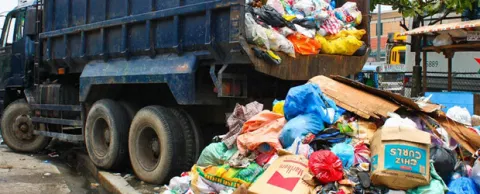
Collecting trash from public places using a traditional paper-based scheduling and tracking system – and sometimes by using intuition and memory – isn't the most efficient way to stay ahead of accumulated trash. In January, Edinburgh city officials worked with Council Associate Partner Enevo to find out if the company's waste collection technology would be a good fit to meet the city's collection needs. If your city is experiencing problems with trash collection, our story may give you some ideas for how to solve it – and do it efficiently. — Doug Peeples
Edinburgh and Enevo kicked off a waste collection trial by installing sensors using ultrasonic technology in about 100 trash containers in the city center, followed later by 200 more. The trial will continue until the end of the year. At that time, city officials will decide if the new technology will be deployed citywide.
City officials are pleased with the progress of the project. In areas where trash accumulates quickly, collections increased by 24% and even more in some locations. A city spokesman said that as a result of the data they have been able to collect from the Enevo sensors, collection routes and schedules have been changed to make them more responsive and efficient.
While trash collections in heavy use areas have increased, city officials have found they can reduce overall collections by about 80% and reduce wasted time and fuel emptying bins that were no more than half full. And that meant city employees had more time for street cleaning and other responsibilities, according to an Enevo blog post.
The sensors can detect how full the containers are, transmit the information to the City of Edinburgh Council's waste management system and let operators know if there are containers that require immediate pickup. The Enevo technology also tracks if collections are completed as scheduled and includes a heat sensor that sends an alert if a fire is detected in a container.
"We are learning a lot from this trial which has so far been a success. The sensors are currently in litter bins, but if the positive results continue we'd like to see this roll out to communal bins and recycling banks," said Councillor Lesley Hinds. "The success of the pilot is attracting a lot of attention from other major cities particularly in the U.S., where the authorities in Washington, D.C. have contacted us to share our experiences with them.
More on managing waste...
To learn more about waste management strategies, cutting costs, recovering materials and energy from waste and more, click to the Waste Management chapter in the Smart Cities Readiness Guide. There, you will be able to learn more about smart waste collection technologies and read case studies on how automation and other technologies can increase waste management efficiencies.
Doug Peeples is a Portland, Oregon-based writer specializing in technology and energy. Follow @smartccouncil on Twitter.



